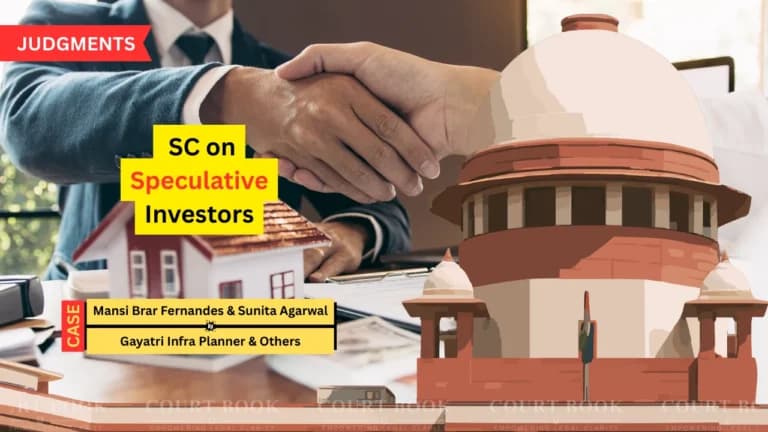In a ruling that could reshape how investors approach housing projects, the Supreme Court on Friday dismissed appeals by two Delhi-NCR buyers seeking insolvency action against defaulting builders. The bench, led by Justice R. Mahadevan, agreed with the National Company Law Appellate Tribunal (NCLAT) that both applicants were “speculative investors,” not genuine homebuyers entitled to invoke the Insolvency and Bankruptcy Code (IBC).
Background
The case stemmed from petitions by Mansi Brar Fernandes and Sunita Agarwal, who had invested in separate residential projects in Greater Noida and Dwarka. Each had signed buy-back agreements promising extraordinary returns—one offered a ₹1 crore payout on a ₹35 lakh investment within a year, the other a 25% annual return.
When projects stalled and cheques bounced, both women moved the National Company Law Tribunal (NCLT) under Section 7 of the IBC, which allows financial creditors to trigger corporate insolvency proceedings. The NCLT admitted their pleas, but the NCLAT reversed these orders, branding the agreements speculative.
Read also: Supreme Court Quashes Gujarat HC Order Allowing Counter-Claim in Family Property Dispute
Court’s Observations
The Supreme Court backed the appellate tribunal’s view that such deals resemble financial trades rather than genuine home purchases.
“Schemes of assured returns, compulsory buybacks, or excessive exit options are in truth financial derivatives masquerading as housing contracts,” the bench observed.
It stressed that the IBC is meant to revive viable projects, not serve as a recovery tool for investors chasing high profits.
The judges noted telltale signs of speculation: unusually high guaranteed returns, absence of efforts to take possession, and agreements far removed from standard builder-buyer contracts.
Justice Mahadevan underlined, “Possession of a dwelling unit remains the sine qua non of a genuine homebuyer’s intent.”
Read also: Supreme Court Upholds Heirs' Right Over Gurgaon Farmland, Declares 1973 Sale Deed Void for Lack of
Decision
Dismissing the appeals, the Court affirmed that Fernandes and Agarwal could not initiate insolvency proceedings as financial creditors. However, it left the door open for them to pursue remedies under consumer protection laws or the Real Estate Regulatory Authority (RERA). Importantly, the bench also clarified that while the 2019 IBC amendment requiring collective action by at least 10% of allottees normally applies, parties cannot be penalised if court delays made compliance impossible.
Case: Mansi Brar Fernandes & Sunita Agarwal vs. Gayatri Infra Planner & Others – Supreme Court on Speculative Investors
Decision Date: 2025 (Reported as 2025 INSC 1110)













